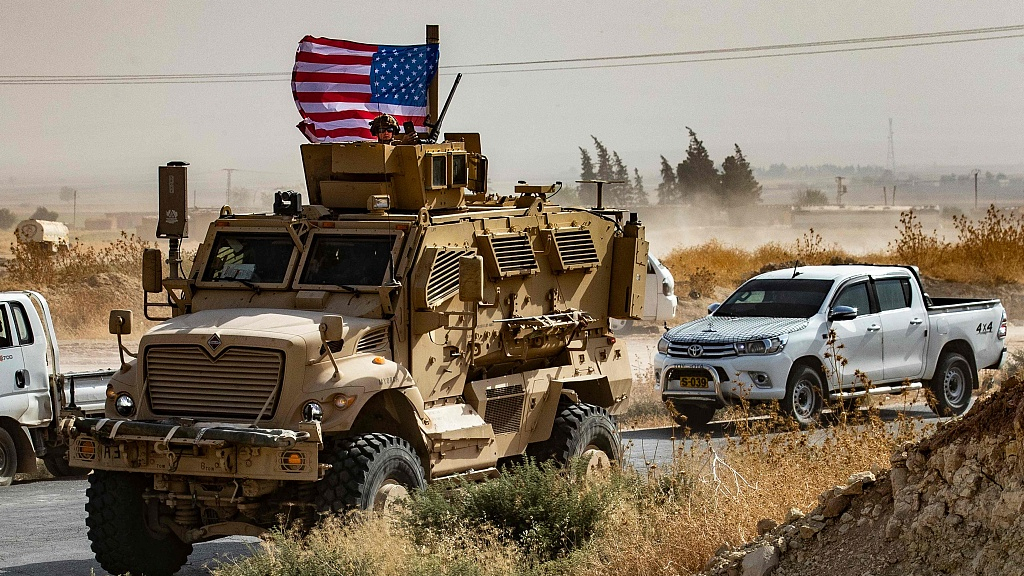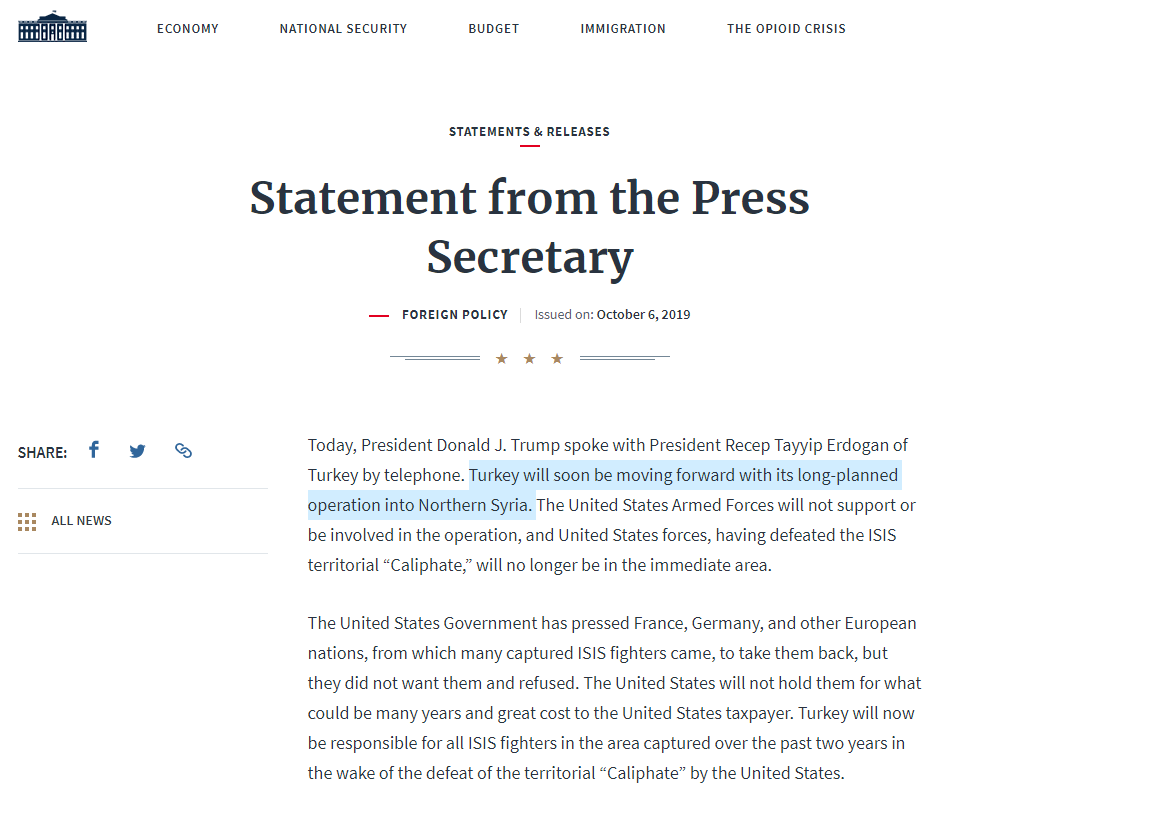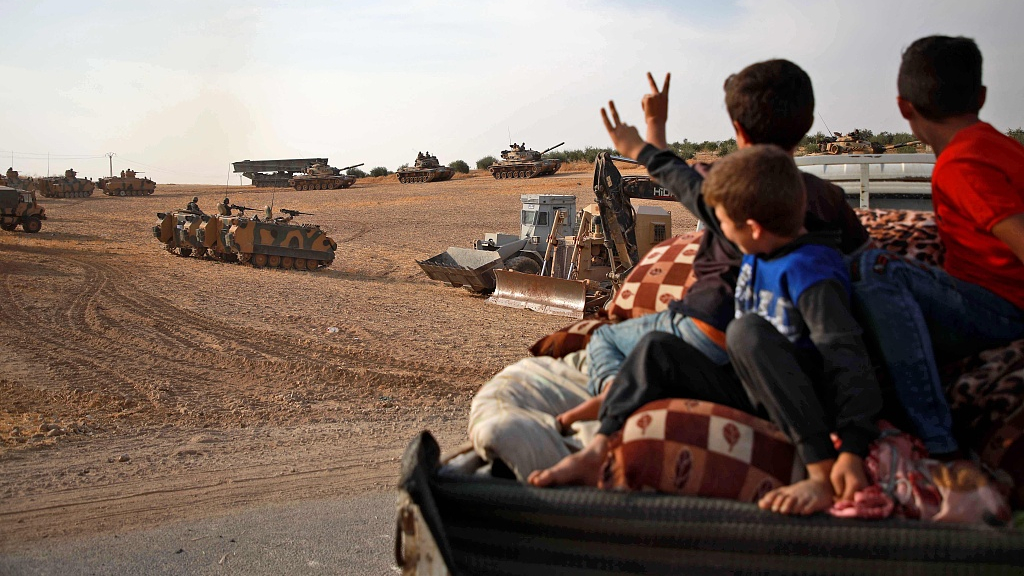
A U.S. soldier sits atop an armored vehicle during a demonstration by Syrian Kurds against Turkish threats next to a base for the U.S.-led international coalition on the outskirts of Ras al-Ain town in Syria's Hasakeh province near the Turkish border, October 6, 2019. /VCG Photo
A U.S. soldier sits atop an armored vehicle during a demonstration by Syrian Kurds against Turkish threats next to a base for the U.S.-led international coalition on the outskirts of Ras al-Ain town in Syria's Hasakeh province near the Turkish border, October 6, 2019. /VCG Photo
The Turkish offensive against the Syrian Kurdish fighters over the past six days has seen over 200 people killed, including 69 civilians, and left nearly 200,000 people displaced – apparently the reason why the U.S. imposed sanctions Monday on its NATO ally.
Washington also demanded an immediate end to Turkey's deadly incursion in the north and northeastern Syria, alleging Ankara's action is putting civilians at risk while letting hundreds of imprisoned Islamic State extremists to escape.
It is difficult to gauge whether Washington is hypocritical at best or deceitful at worst in taking visible action against the Turkish offensive that was not only enabled by U.S. President Donald Trump's surprise decision last week to pull out American troops from Syria-Turkey border but was ironically announced by the White House itself.
"Turkey will soon be moving forward with its long-planned operation into Northern Syria," a White House statement issued on October 6 said as Trump announced U.S. forces "will no longer be in the immediate area."

A screenshot of the White House statement announcing Turkey's "long-planned operation into Northern Syria." /CGTN Photo
A screenshot of the White House statement announcing Turkey's "long-planned operation into Northern Syria." /CGTN Photo
Can the U.S. be a trusted ally?
Trump's decision at once abandoned the Syrian Democratic Forces (SDF) – a Kurdish People's Protection Units (YPG) led alliance of Kurdish and Arab fighters formed in 2015 – key U.S. allies who were instrumental in eliminating the Islamic State group's (ISIL)so-called "caliphate" from the region.
The YPG is viewed as a "terrorist" threat by Ankara for its alleged ties with the Kurdistan Workers' Party (PKK), an armed political organization founded with an initial aim to create an independent Kurdish state but later changing its position to demand Kurdish autonomy in Turkey. The PKK has fought a long insurgency against the Turkish state.
The U.S. President went ahead with the pullout despite facing domestic political opposition blaming him for leaving the SDF in the lurch and amid heightened international concerns, including from close allies Britain and France, over the fallout of the then imminent Turkish invasion.
With the American troops receded, Turkish President Recep Tayyip Erdogan predictably began the "long-planned" military operation in Syria on October 9. The Syrian rebels back Ankara under their command in the ensuing offensive. This includes nearly 18,000 mainly Sunni Arab militia that call itself the Syrian National Army, also known as the Free Syrian Army.
The withdrawal of U.S. troops from Syria also prompted discussions in the Middle Eastern capitals about whether Washington could ever be trusted as an ally given how it dumped the SDF. While the Pentagon and top U.S. officials, including the President, later publicly denied abandoning their Syrian Kurdish allies, Trump's decision has undoubtedly pushed the region, once again, in upheaval.
"This is total chaos," a senior official from Trump administration was quoted by The Washington Post. Although "the Turks gave guarantees to us" that U.S. forces would not be harmed, the official said, the Free Syrian Army fighters "are running up and down roads, ambushing and attacking vehicles," putting American forces – as well as civilians – in danger even as they withdraw.
The Free Syrian Army, "are crazy and not reliable," the official added.
Shifting balance of power

A handout picture released by the official Syrian Arab News Agency (SANA) on October 14, 2019 shows Syrian government forces waving national flags as they enter the northern town of Ain Issa in the countryside of Syria's Raqqa region, near Tal Abyad which is currently under the control of Turkish forces. /VCG Photo
A handout picture released by the official Syrian Arab News Agency (SANA) on October 14, 2019 shows Syrian government forces waving national flags as they enter the northern town of Ain Issa in the countryside of Syria's Raqqa region, near Tal Abyad which is currently under the control of Turkish forces. /VCG Photo
Sensing a strategic void, Russia promptly clinched a deal between the Syrian government led by President Bashar Assad and the SDF. Damascus and the Kurdish fighters so far had frosty ties since the minority group threw its lot in with Washington and unilaterally declared self-rule in northeast Syria as Assad's military fought rebels elsewhere.
Assad on Monday started moving his forces for the first time in five years to northeastern Syria towards the Turkey border, invited by the SDF whose desperate calls for protection and air cover from the erstwhile ally, the U.S., fell on deaf ears. According to reports, Russian mediation also resulted in pro-Iranian militia moving in to back the Kurdish fighters.
"All of it was foreseeable: the death and displacement, the atrocities, the flight of jihadists and the return of a brutal regime. But it has happened more quickly than almost anyone predicted… Hundreds of Islamic State (ISIL) supporters, once held by the Kurds, have escaped into the desert scrub… Small though it may seem, President Donald Trump's abrupt decision to withdraw troops from northeast Syria has reshaped the Levant," The Economist said in an analytical piece.
Geostrategic observers note that a common outrage against Erdogan's impulsive invasion of Syria appears to have united many regional countries and rival powers as they view Turkish action as reckless and destabilizing for the entire Middle East.
"Even as the EU, the U.S., Russia, Iran and the Arab states voice their differing objections to the invasion…, each is simultaneously trying to adjust to it, looking for advantage or leverage as the balance of power in Syria shifts again," The Guardian said in an opinion piece.
Some analysts feel the latest U.S. sanctions against Turkey are a late attempt by Washington to correct a disastrous decision. Dumping the Kurds was terrible enough, but appearing to leave Syria's fate to be decided by U.S. foes Russia and Iran, also Assad's main allies, is clearly a strategic self-goal by Washington, they felt.
Nightmare for Europe?

Syrian Arab civilians flash the victory sign as Turkish armored personnel carriers and U.S.-made M60 tanks gather in the village of Qirata on the outskirts of the northern Syrian city of Manbij near the Turkish border, on October 14, 2019. /VCG Photo
Syrian Arab civilians flash the victory sign as Turkish armored personnel carriers and U.S.-made M60 tanks gather in the village of Qirata on the outskirts of the northern Syrian city of Manbij near the Turkish border, on October 14, 2019. /VCG Photo
Meanwhile, other observers have described Washington's pullout from Syria as a "boon" for the Islamic State and a "nightmare" for Europe, heightened by Trump's strange assurance that his decision will not have any threat to the U.S. homeland as "they're (Islamic State extremists) going to be escaping to Europe."
Kurdish forces have already claimed that hundreds of Islamic State (ISIL)prisoners had escaped from the Ain Issa detention facility, while two officials told the New York Times that the U.S. military had failed to secure 60 or so high-value detainees before its forces departed. Earlier reports, however, confirmed that two of the most notorious Islamic State (ISIL)militants of British origin known as "the Beatles," linked to beheadings of captive foreigners, were in the U.S. custody and moved out of Syria.
"Europeans, to be sure, will not find this reassuring. Given the thousands of Europeans who went to fight for the Islamic State (ISIL)and the problems Europe has had with jihadist terrorism in general, they should be alarmed by the U.S. abandonment of the Syrian Kurds and the possible escape of large numbers of Islamic State prisoners," Daniel Byman, a professor in the School of Foreign Service at Georgetown University and a senior fellow at the Brookings Institution, wrote in a piece for VOX news site.
"The good news is that the potential threat illustrates the counterterrorism progress made in the years since 9/11, but the end of the U.S. role in Syria is clearly bad news," he added.
The European Union has also expressed concerns over the inflow of refugees from Syria and Turkey in the worsening situation. Officials in the E.U. fear that many of the four million refugees Turkey is hosting – most of them Syrians – may decide to head to Europe to avoid being forcibly pushed back into their unstable homeland.